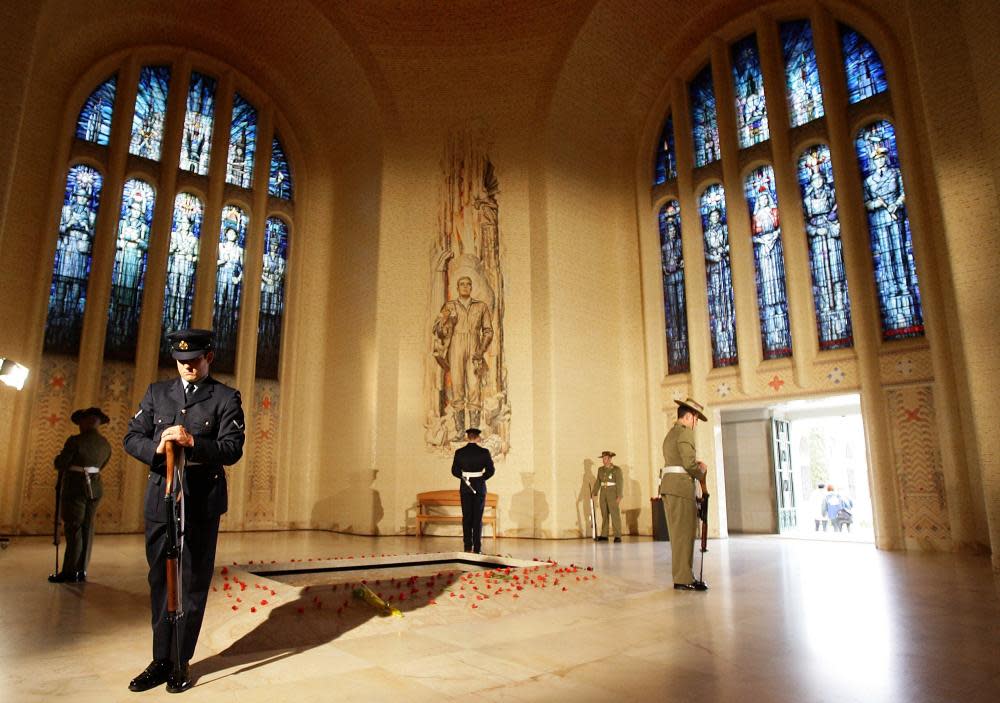We can't lose sight of how important Anzac Day is to Australia

If there is a fourth law of thermodynamics, it is “public holiday Twitter sucks”.
I don’t know if it is the temperature, the energy or the entropy of a day off that gives online discourse this fundamental physical property of suction, but there it is. And Anzac Day Twitter sucks like the vacuum of space. Ask Jim Wallace (2011), Scott McIntyre (2015) and Yassmin Abdel-Magied (2017).
What does this year hold?
If you considered Twitter representative of public sentiment, you might conclude that Anzac Day has become a divisive occasion. This would be a big mistake.
Throughout my living memory (I was born in 1972) Anzac Day has grown every year. The first dawn services I attended were those held at the Australian War Memorial in Canberra. In the early 1980s these were held in the commemorative courtyard and attended by a few hundred people.
The rest is history. Within 10 years I would watch from a crowd of many thousands to see my father march past with other Vietnam veterans for the opening of the memorial to their war. The laying to rest of the Australian Unknown Soldier in 1993 was a similarly large occasion. By 2015, I could take my children to a dawn service at the memorial to mark the centenary of their great-grandfather’s landing at Anzac Cove, but we were in a crowd that had increased a hundredfold in my lifetime, and we were nearly as far away from the pool of remembrance as the beach at Anzac is from the Nek.
It is an overwhelmingly right and good thing that Anzac plays this role in our national life. These are unifying occasions for our nation and they should remain so. They are also among the absolute handful of occasions on which Australian public life achieves real dignity and even self-effacement.
We need this kind of thing badly.
Yet the pushback has begun. Anzac declined for two decades from, say, 1960 and has grown for four decades since about 1980, and now there’s a growing appetite for another cycle of decline and a revision of Anzac memorialisation.
I am not thinking of the policy debate about the balance of public spending on commemorations (and certainly, Australia’s is very high among comparable countries) compared with veterans’ services – especially for mental health, and especially for young veterans. That’s quite a different critique from the sceptical revision of the social role of Anzac Day.
And I am concerned that in trying to rescue Anzac from the Anzac birthers – a very droll formulation, by the way – the revisionists get the balance wrong and misunderstand how important to Australia Anzac Day is and should be. Being human institutions, the Anzac ceremonies contain elements of repetition and hyperbole; the speeches contain elements of populism and kitsch; and there is something to make a professional historian (or a professional cosmopolitan) wince. Without fail. Every year.
What is the real alternative for our nation?
Would the revisionists prefer something that looks more like the AFL Grand Final or the Commonwealth Games closing ceremony? Do the revisionists believe Australia could be united by an annual performance of Britten’s requiem?
Anyone of a certain education and temperament can sit through a speech and wish it were better – even one they’ve written themselves – but I think the liberal critics risk missing the big picture here.
Anzac Days are about as good as Australian public ceremony gets and Anzac Day is about as good as Australian patriotic sentiment gets. Australia desperately needs unifying, inclusive national institutions. Australians of goodwill, of all politics and of every national origin, desperately need to state and defend an inclusive account of patriotism. It would be good if these elements were extended to phases of our national life other than the experience of war. That would be achieved by improving the nature of those occasions, not by deprecating the status of Anzac Day.
Anzac Day works and we need it to keep working. It’s far more authentic, dignified and inclusive than our politics or our media. And it’s light years ahead of our tweets.
So I really do hope Wallace, McIntyre and even Abdel-Magied give it a rest this Anzac Day. It’s not about them, and it’s not about hot takes, and it’s not about division. Just as I hope the liberal critics take a moment out from grinding their teeth at dying metaphors to think how remarkable it is that postmodern Australians are so determined not to forget their dead.
Wednesday ideally would not be a sentimental day but it rightly will be an emotional day: of gratitude, of sorrow, of pride, even of despair. It isn’t the National Day but it is a national day, one in which every Australian has a place and all can remember service, suffering and death.
Our state keeps sending men and women to war and we should keep remembering. Our society gets more complicated every year and we should keep finding things we hold in common and hold on to them really tight.
All of us.
And it is actually possible to remember in silence. Lest we forget.
Michael Cooney is national director of the Australian Republican Movement

 Yahoo News
Yahoo News 
